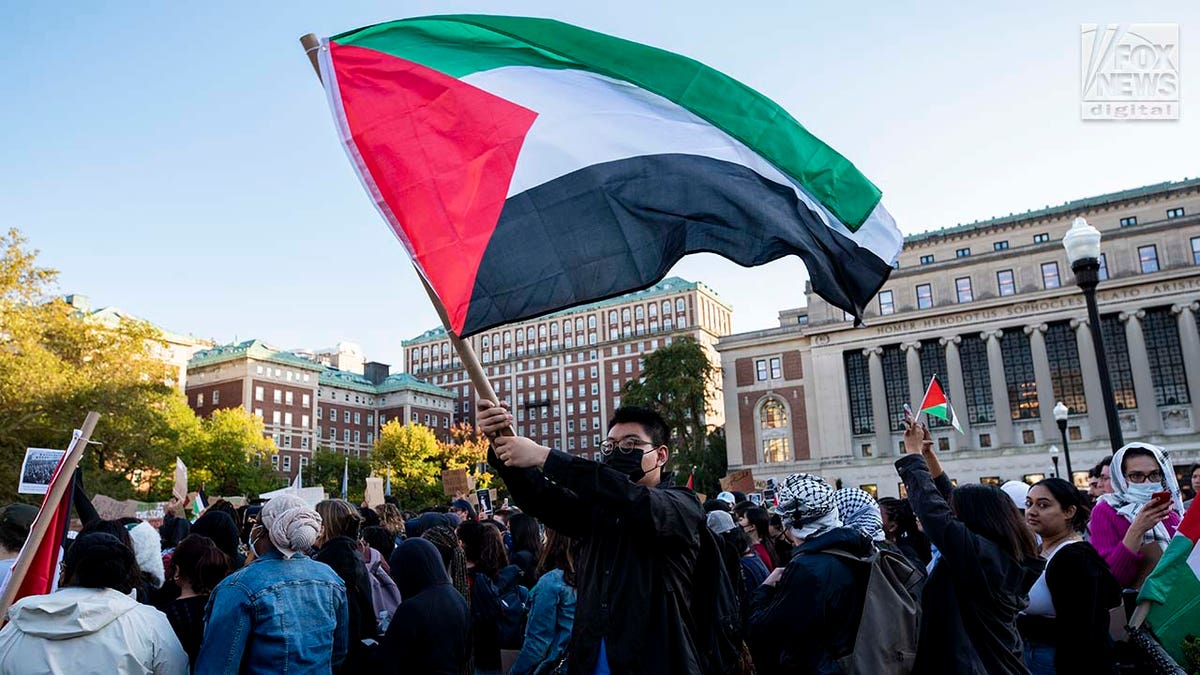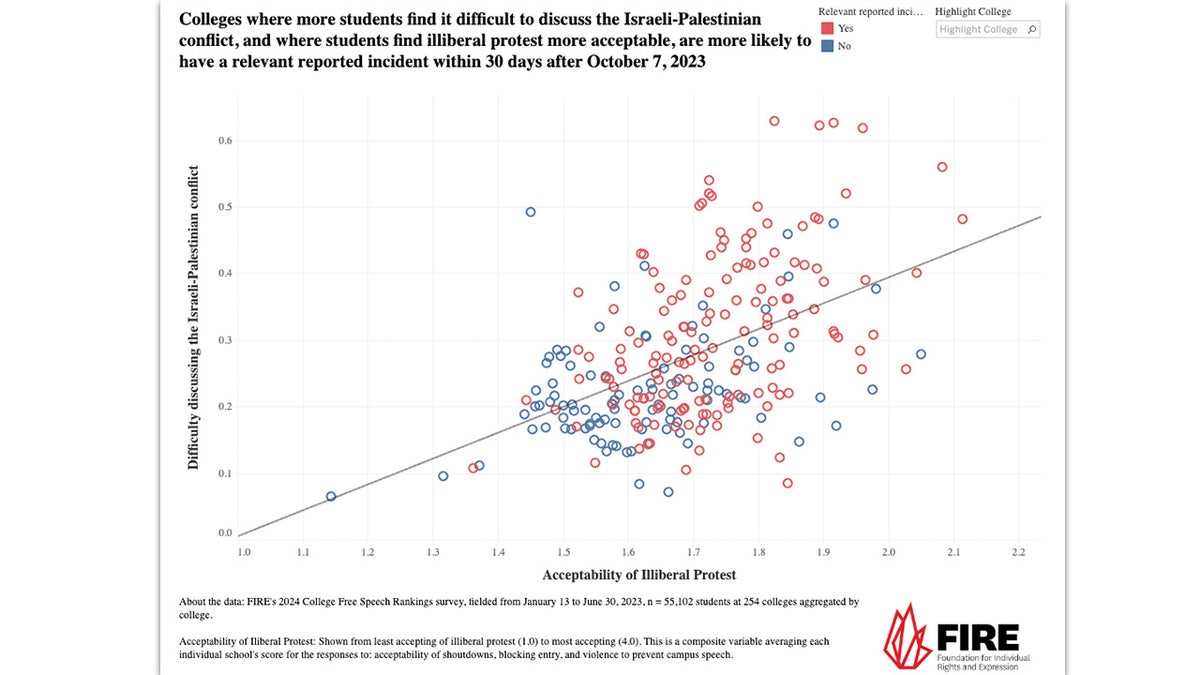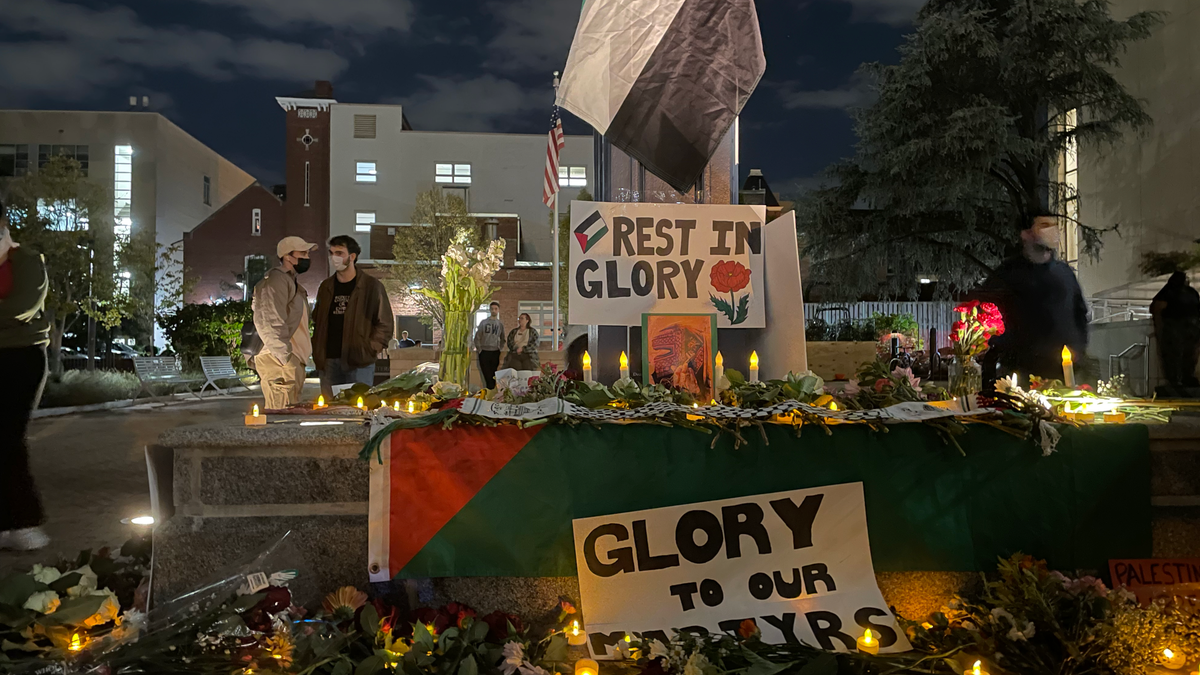Students hide identities with masks while praising Hamas' massacre of Israelis
A group of around 50 students gathered at George Washington University to hold a vigil for Palestinian "martyrs." One organizer claimed the Hamas attacks were "not unprovoked."
Universities with intolerant speech climates have been more likely to experience Israeli-Palestinian conflict-related incidents on campus, according to a civil liberties nonprofit.
"Colleges where students felt they couldn’t openly discuss the Israeli-Palestinian conflict were powder kegs just waiting to go off," concludes a recent report from the Foundation for Individual Rights and Expression, a nonpartisan group that advocates for free speech rights.

Pro-Palestinian demonstrators attend a protest at Columbia University in New York City on Oct. 12, 2023. (Julia Bonavita/Fox News Digital)
UNIVERSITY QUIETLY DROPS FACULTY DEI REQUIREMENTS IN FREE SPEECH 'VICTORY,' CIVIL RIGHTS ORG SAYS
As the Israel-Hamas war becomes a flashpoint on many college campuses, FIRE examined data from its 2024 College Free Speech Rankings.
Researchers found that colleges where students accept "illiberal forms of protest" — such as shouting down speakers or using violence to stop a campus speech event — were also places where students reported having a hard time talking about the Israeli-Palestinian conflict, even before Oct. 7.
These schools were more likely to have had protests, walkouts, classroom disruptions, vandalism or other incidents in the month following Hamas' attack on Israel, according to FIRE's analysis.

FIRE's analysis of campus speech climates and post-Oct. 7 incidents used data from its most recent free speech rankings. (Foundation for Individual Rights and Expression)
MOMS SUE STATE OVER 'CREEPY' BABY BLOOD DATABASE, PRIVACY CONCERNS
Campuses with shaky speech climates included George Washington University, where students held a vigil for Palestinian "martyrs" and, on a separate occasion, projected pro-Palestinian messages on the side of the school library. And at Tulane University, a pro-Palestinian rally devolved into a brawl that ended with three students being assaulted.
The report acknowledges that "correlation is not causation," but calls the results "not surprising."
"Where campus tensions bubble below the surface, sudden flare-ups might become more likely in response to distressing events," the report states.
FIRE surveys tens of thousands of students across the nation each year to help determine which colleges are the most — and least — accepting of different viewpoints. The most recent survey of 254 colleges was fielded from January through June of this year, well before Hamas' attack.
FIRE president Greg Lukianoff told Fox News he has "no doubt" that what is happening on campuses after Oct. 7 will influence next year's College Free Speech Rankings.
"Those ratings were not good already, particularly on Israel-Palestine," he said. "And I think they are going to absolutely crater this next year."

Students held signs and read poems in support of Palestinian "martyrs" on the George Washington University campus in October 2023. GWU ranked high for both acceptance of illiberal protest and student difficulty discussing the Israeli-Palestinian conflict in FIRE's most recent campus survey. (Jon Michael Raasch/Fox News Digital)
CLICK HERE TO GET THE FOX NEWS APP
The FIRE survey also found that just 1 in four 4 students believe a pro-Israeli student group should be allowed on campus, compared to 58% of Jewish students who believe a pro-Palestinian group should be allowed.
Students at private colleges were more accepting of "illiberal protest" than their peers at public universities but also found it more difficult to have an open and honest conversation about the Israeli-Palestinian conflict, the survey found.




















